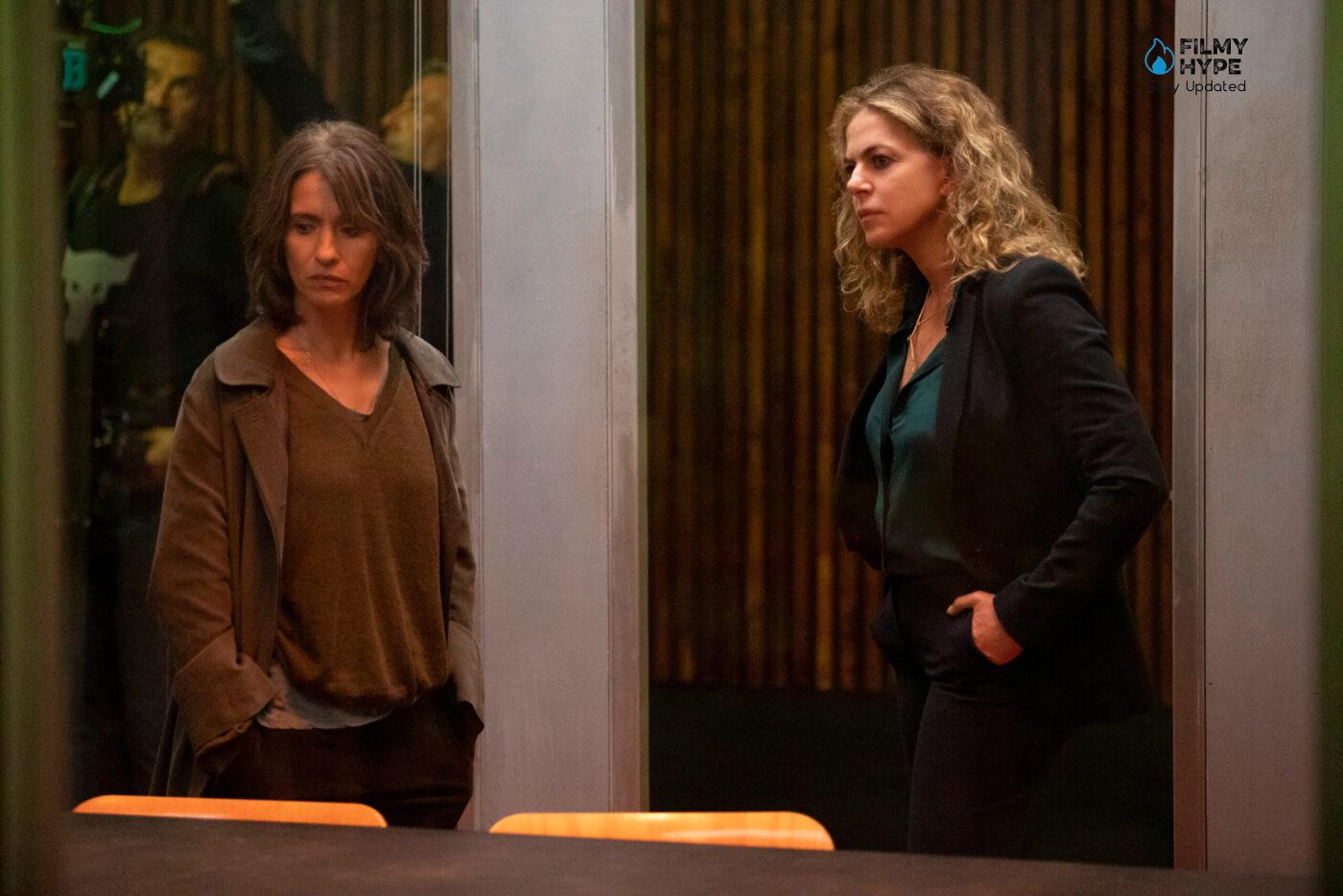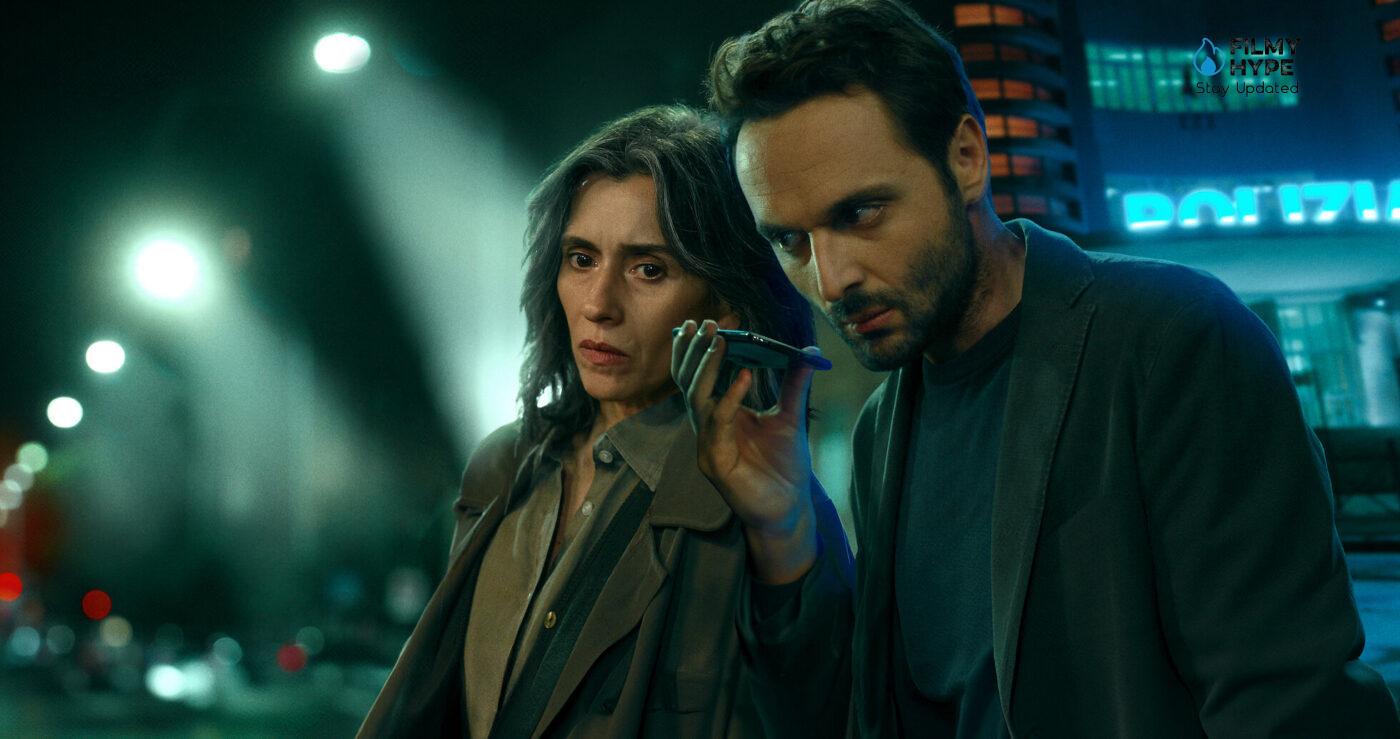Sara – Woman in the Shadows Review: Stands Out For Its Intimate Gaze on Pain and Resilience
It was only a matter of time before another literary saga by Maurizio De Giovanni was adapted for the small screen. We are talking about Sara – Woman in the Shadows (Original title: Sara: La donna nell’ombra), a six-episode crime series written by Donatella Diamanti, Mario Cristiani, and Giovanni Galassi and directed by Carmine Elia for Netflix. In the already vast panorama of Italian detectives, Sara – Woman in the Shadows – a silent yet authoritative presence is carved out. Available on Netflix, the six-episode series taken from Maurizio de Giovanni’s novels marks the entrance on the small screen of an anomalous character: Sara Morozzi. Former secret service agent, invisible by training and lonely by choice, Sara is neither an action heroine nor a figure looking for redemption. She is a woman who has chosen silence as a refuge and as a weapon.

Teresa Saponangelo, in her shoes, builds a female figure that undermines every cliché of the television crime: she does not seduce, she does not wear makeup, she does not wink. Investigate with the eyes, with the mind, and with the restrained pain that deforms every gesture. The starting point is a sudden mourning: the death of the son with whom he had cut all ties. An event that reactivates in her not only the instinct as an agent, but also a deeper question about her role as mother, woman, and executioner. From here, a story takes shape that is more noir than soul than surface thriller, more inner novel than black chronicle.
Sara – Woman in the Shadows Review: The Story Plot
Unlike many crime series, where the plot is based on intrigues and twists, in Sara – Woman in the Shadows, what keeps her glued is the inner path of the protagonist. His investigation is not so much an investigative work as a journey through the fractures of his life. The mystery to be solved – the death of his son, perhaps linked to something shady in his company – is the narrative trigger, but not the emotional center of the story. The crime part, although present, remains in the background. Suspense moments are measured, almost always diluted in the slowness of an investigation that is played more on looks and intuitions than on twists. It is a countercurrent approach, which can confuse those who expect a traditional yellow, but which rewards those seeking psychological complexity. The title Sara has the face of Teresa Saponangelo, who returns to the camera to interpret a former internal secret service agent.

We meet her for the first time in the middle of the night when a phone call warns her that her only son, with whom she had no relationship since he was still a boy, died in an apparent traffic accident. A tragic event that restarts his instinct as an agent. A handful of minutes that allow us to understand who we are dealing with. A professional with intuitive and unusual qualities. But, at the same time, a woman who allowed the loneliness to wrap itself, creating a fraction between itself and the rest of the world. A choice also dictated by pain for another loss that marked his life. To better understand what happened on the night of the accident, Sara asks Teresa (Claudia Gerini) for help, a friend and colleague with whom she has shared secret and high-risk investigations for years. That favor, however, marks the beginning of a non-return. The woman finds herself again involved in his old life, between stalking, investigation, danger, and a puzzle that is composed, piece by piece, under his eyes. But it must be said that the crime part is the least engaging part of the story.
Sara – Woman in the Shadows Review and Analysis
What strikes the series is the quality of the relationships between the characters. Sara is not alone: a chorus of equally marked figures moves around her. There is Teresa (Claudia Gerini), the former colleague and friend, symbol of a past never really achieved. There is Pardo (Flavio Furno), a young inspector who becomes his shoulder – and, perhaps, his second maternity occasion. There is Viola (Chiara Celotto), the pregnant girlfriend of the deceased son, with whom he builds a silent but powerful bond. The interactions are dry, often sarcastic, but full of subtexts. The characters are rarely explained; they are observed, avoided, and protected. The writing focuses on essential dialogues, often whispered, which leave room for gestures and emotional subtlety. It is precisely in this choice that the most interesting stylistic code of the series emerges.
Set in a Naples far from postcard stereotypes, Sara – Woman in the Shadows tells a city made of interiors, nocturnal silences. Carmine Elia’s direction renounces any tourist aesthetic and embraces a dark, bruised-toned photograph. There is no color or noise: there is a suspended atmosphere that well reflects the soul of the protagonist. This Naples is a living but restrained organism, made up of gray offices, deserted terraces, and cars that cross sleeping neighborhoods. Here, too, the choice is against the current: rather than focusing on the fast pace and action, the series opts for a dilated narration, made up of expectations, returns, and secrets to be deciphered. A choice that can be unsettling, but consistent with the general tone of the story.

In Sara’s heart, there is a different idea of justice in the shadows. Not the spectacular one of weapons or raids, but the intimate one of those seeking truth without fuss. Sara is not an agent in search of revenge, but a woman who no longer wants to turn away. Its path has nothing triumphant: it is a slow ascent from silence. It is justice that passes through the gaze, through meticulous observation, through silent deduction. It is also, and above all, a reflection on what it means to face pain when there is nothing more to lose. Sara is alone, but not surrendered. He lives in the shadows, but by choice. And it is precisely from this marginality that it draws its strength: in the world of artificial lights and blatant declarations, its silent presence becomes an act of resistance.
Sara – Woman in the Shadows is a series that does not scream, but whispers. It does not run, but advances with determination. It is a story about pain, memory, and the need to put the pieces back together, even when it is too late. It is the portrait of a woman who paid with absence, but who does not stop seeking justice, truth, and – perhaps – redemption. The strength of the series does not lie in the plot, which, in fact, at certain times, weighs down with redundant explanations and didactic flashbacks. It is in its protagonist and in the way it is shown to us: an ordinary woman, yet unforgettable. This is what makes Sara – Woman in the Shadows something more than just a crime: an emotional, human, ethical portrait. A noir who digs into silence to bring out what words often cannot say.

What works of Sara – Woman in the Shadows have their human and relational component. Teresa Saponangelo, always very good, infuses her character with a pain composed, retained, and kept silent. Yet palpable. As well as a vein of irony and an impetuous temperament. Many different facets come to the surface in its relationship with the other protagonists of the story. From the aforementioned Teresa, with whom she has a frank and at times conflicting relationship, to that with Pardo (Flavio Furno), inspector who chooses as her shoulder and who is often the victim of her sarcasm, up to Viola (Chiara Celotto), companion of the son with whom he establishes a slow relationship of trust and tenderness. The crime and investigative component is present and also of a not indifferent narrative weight. But it’s not that, though attentive to current events in its thematic implications related to politics and the influence of public opinion, to surprise or fascinate the viewer more.
Sara – Woman in the Shadows Review: The Last Words
Sara – Woman in the Shadows is an existential noir that stands out for its intimate gaze on pain and resilience. Teresa Saponangelo offers a magnetic interpretation of a silent but determined protagonist, who investigates not only the mystery but the very meaning of her choices. Crime is only the background of a human drama that finds its true narrative strength in silence and relationships. Last television transposition of a work by Maurizio de Giovanni, Sara – Woman in the Shadows, sees Teresa Saponangelo as a former secret service agent whose life is turned upside down by the death of her son, with whom she had no relationship for years. An event that brings her back to her old profession. Although the crime component is present and constitutes a founding narrative column, the real strength of the series lies in the story of human relationships. Saponangelo’s interpretation gives the character a compound but palpable pain, enriched by a vein of irony, which triggers relational dynamics with the other characters. Although the investigative trend draws attention to current issues, the series is more akin to generalist productions than to what should be the narrative and directorial audacity of a platform title like Netflix.
Cast: Teresa Saponangelo, Claudia Gerini, Flavio Furno, Chiara Celotto, Carmine Recano, Francesco Acquaroli
Created By: Donatella Diamanti, Mario Cristiani, Giovanni Galassi
Streaming Platform: Netflix
Filmyhype.com Ratings: 3.5/5 (three and a half stars)







